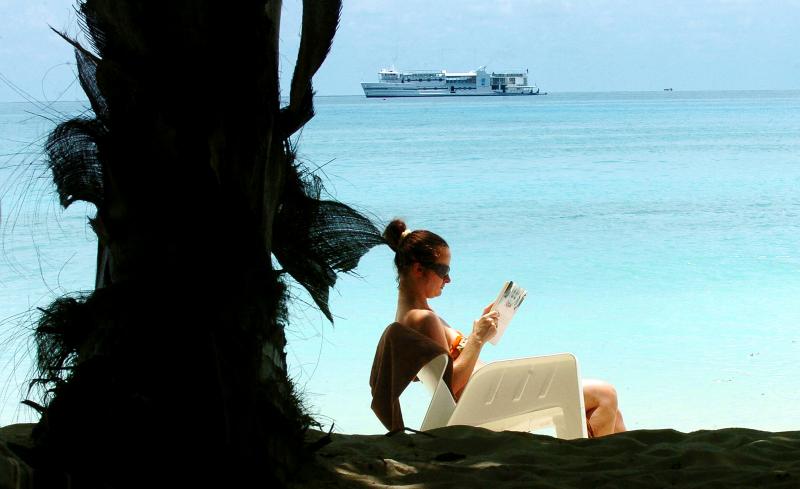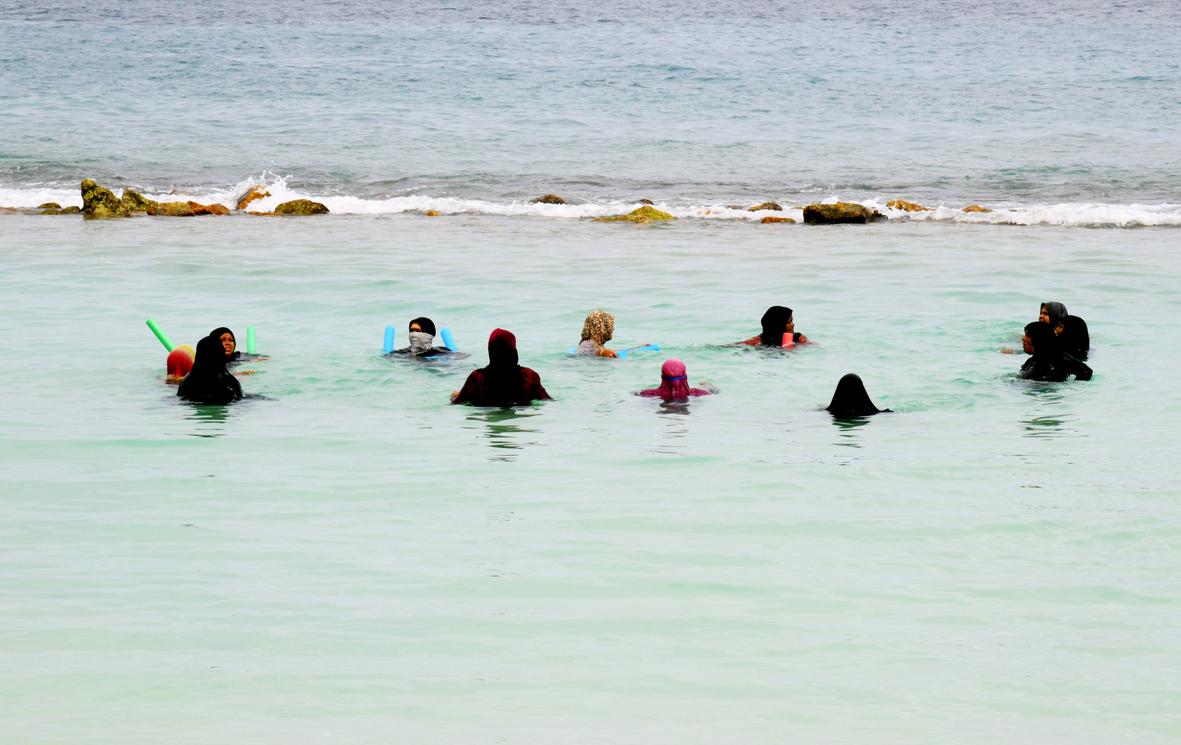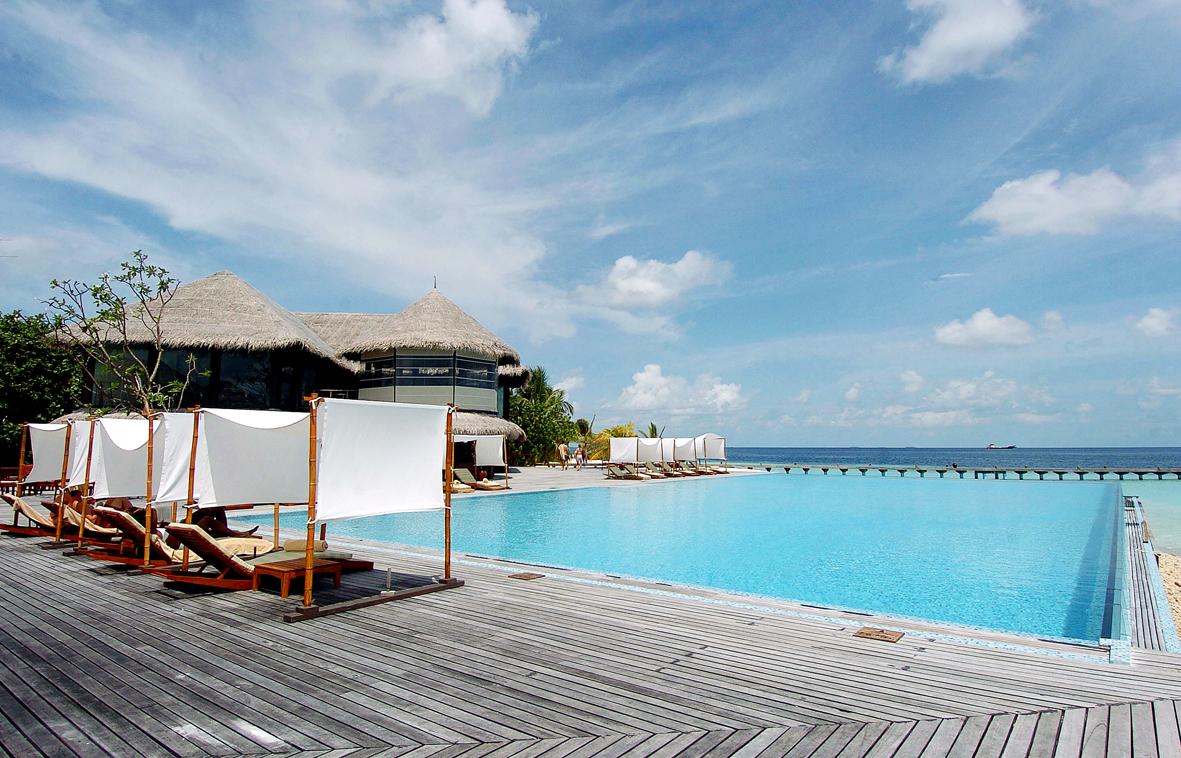White sands, blue skies... and lots of books. Applications have opened for what might just be the best job in the world: running a bookshop on a luxury desert island in the Maldives.
Passionate lovers of books — who are also adventurous, outgoing, creative and don’t mind spending all day barefoot — are sought for the year-long contract, which starts in October and involves moving to live on the remote island of Kunfunadhoo in the Indian Ocean.
The bookselling takes place barefoot, because no shoes are allowed to be worn on the island. Reading a newspaper, even one as compelling as the Observer, would also be frowned upon.

Photo: AFP
“The ethos of the island is: no shoes, no news. They encourage guests to reconnect with the ground,” said Alex McQueen, spokesperson for Ultimate Library, which runs the bookshop with the Soneva Fushi resort, and provides bespoke library collections for hotels, resorts and private residences around the world.
Guests at the resort — usually high net worth individuals — are encouraged to switch off from the digital world and allow their “barefoot butlers” to attend to their needs.
McQueen said the island’s bookseller will need to be a self-starter who is happy to introduce themselves to guests and provide them with personalized book recommendations. The successful applicant will be solely responsible for the day-to-day running of the bookshop, including accounting and stock management.

Photo: AFP
“The applicant will be there on their own, so they’re pretty much running the whole thing themselves.”
For this reason, he is ideally looking for someone with bookselling or publishing experience.
Accommodation for one on the island is provided free of charge and all meals are free. There’s also a gym, access to a spa and watersports like diving, and staff have their own private beach.

Photo: AFP
The basic salary is US$750 a month but it is expected the bookseller will be able to earn extra “service fees” on top by, for example, offering book-related workshops or classes to guests.
Georgie Polhill, 27, who recently finished a six-month contract as a bookseller on the island, said one of the biggest challenges she faced as a “turbocharged Londoner” was getting used to the slow, relaxed pace of life on the island.
“If you tried to fight it too much and harry everyone on to get things done, you would absolutely burst a blood vessel,” she said, adding: “I came back a very different person. I learned an entirely new culture. I made friends that I will have for life.”
She had previously worked for a bookseller in London but will soon start a new career in theater.
This has meant adjusting to wearing shoes again — something which she said “definitely felt weird,” at first.
“I was so unused to wearing anything around my toes and my heels.”

In the March 9 edition of the Taipei Times a piece by Ninon Godefroy ran with the headine “The quiet, gentle rhythm of Taiwan.” It started with the line “Taiwan is a small, humble place. There is no Eiffel Tower, no pyramids — no singular attraction that draws the world’s attention.” I laughed out loud at that. This was out of no disrespect for the author or the piece, which made some interesting analogies and good points about how both Din Tai Fung’s and Taiwan Semiconductor Manufacturing Co’s (TSMC, 台積電) meticulous attention to detail and quality are not quite up to

April 21 to April 27 Hsieh Er’s (謝娥) political fortunes were rising fast after she got out of jail and joined the Chinese Nationalist Party (KMT) in December 1945. Not only did she hold key positions in various committees, she was elected the only woman on the Taipei City Council and headed to Nanjing in 1946 as the sole Taiwanese female representative to the National Constituent Assembly. With the support of first lady Soong May-ling (宋美齡), she started the Taipei Women’s Association and Taiwan Provincial Women’s Association, where she

Chinese Nationalist Party (KMT) Chairman Eric Chu (朱立倫) hatched a bold plan to charge forward and seize the initiative when he held a protest in front of the Taipei City Prosecutors’ Office. Though risky, because illegal, its success would help tackle at least six problems facing both himself and the KMT. What he did not see coming was Taipei Mayor Chiang Wan-an (將萬安) tripping him up out of the gate. In spite of Chu being the most consequential and successful KMT chairman since the early 2010s — arguably saving the party from financial ruin and restoring its electoral viability —

It is one of the more remarkable facts of Taiwan history that it was never occupied or claimed by any of the numerous kingdoms of southern China — Han or otherwise — that lay just across the water from it. None of their brilliant ministers ever discovered that Taiwan was a “core interest” of the state whose annexation was “inevitable.” As Paul Kua notes in an excellent monograph laying out how the Portuguese gave Taiwan the name “Formosa,” the first Europeans to express an interest in occupying Taiwan were the Spanish. Tonio Andrade in his seminal work, How Taiwan Became Chinese,